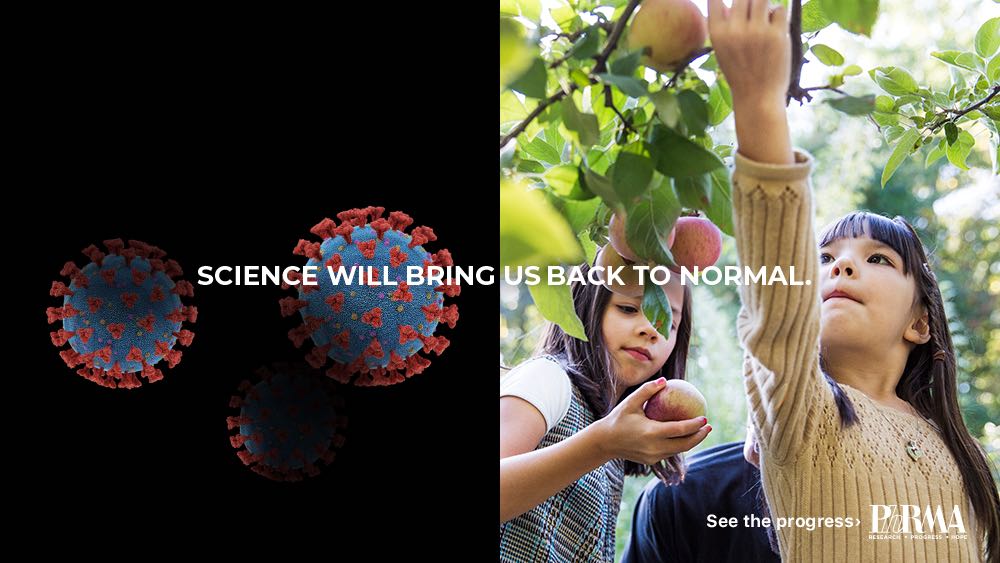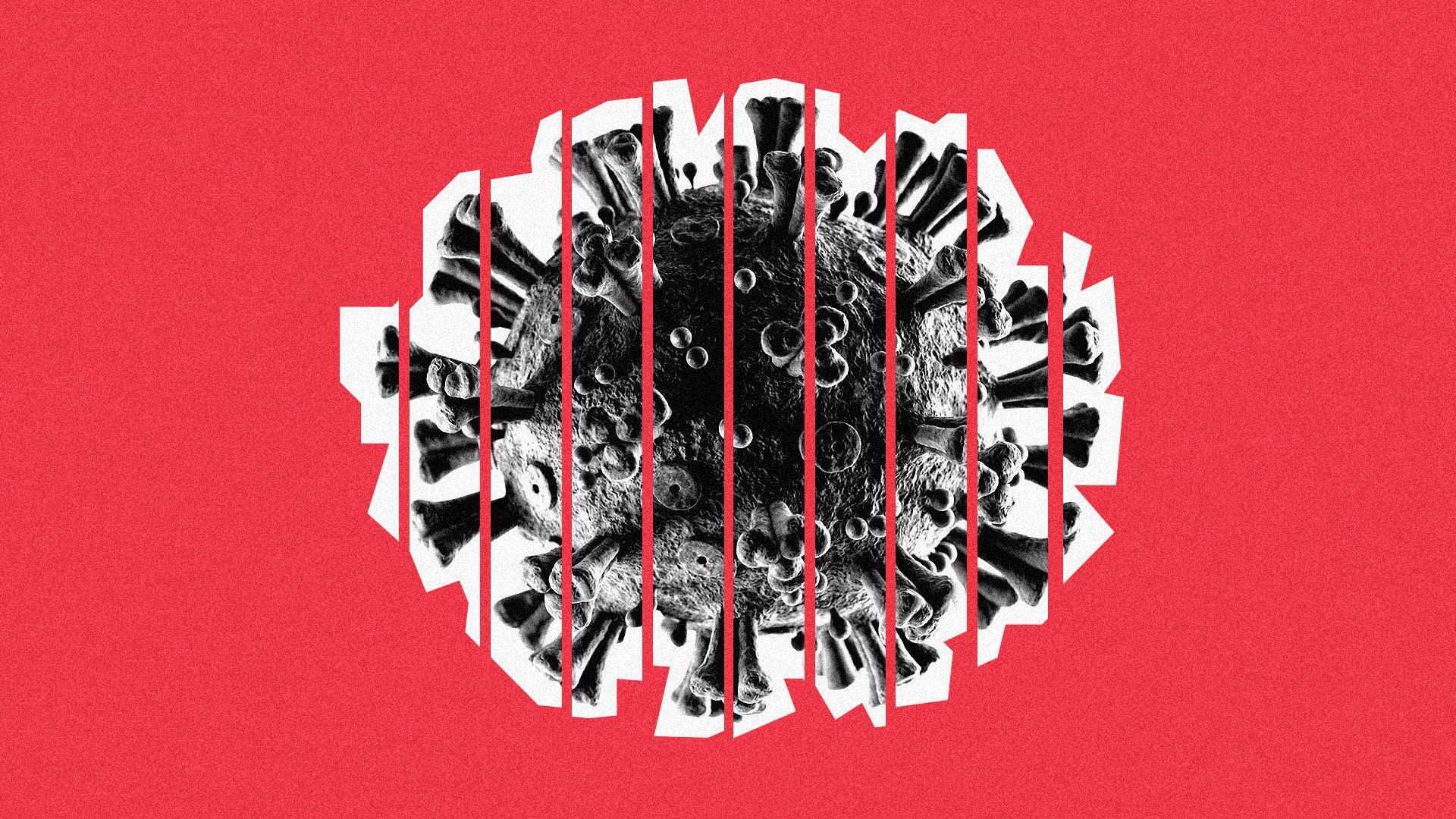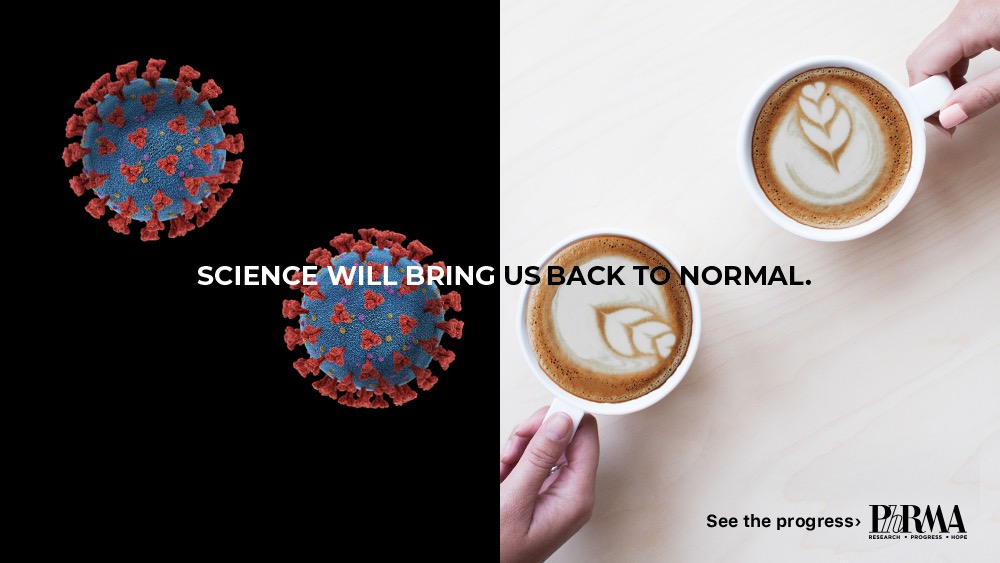| | | | | | | Presented By PhRMA | | | | Vitals | | By Caitlin Owens ·Oct 20, 2020 | | Good morning. Today's word count is 947, or a 4-minute read. | | | | | | 1 big thing: The next wave of the coronavirus is gaining steam |  Data: The COVID Tracking Project; Map: Naema Ahmed/Axios The percentage of coronavirus tests coming back positive is rising across the country, including in states that are also seeing a spike in cases, Axios' Naema Ahmed and I report. Why it matters: High positivity rates indicate a worsening outbreak, and put together with the rise in cases and hospitalizations across the country, suggest that the U.S. is in bad shape. The big picture: The virus is spreading throughout the U.S. It's not concentrated in any one region, as it was during the previous waves. - It's unlikely to spread only among young, healthy people. The American Health Care Association and the National Center for Assisted Living released a report yesterday highlighting the link between community spread and nursing home cases, and showing a recent uptick in both.
By the numbers: Nationally, the positivity rate was 5.3%, on average, over the last seven days — an increase from the 4.7% positivity rate over the prior seven days. - For context, the World Health Organization recommended in May that the positivity rate remain below 5% for at least two weeks before governments reopen. 17 states and D.C. currently met that threshold over the last week.
- Idaho, Nevada, South Dakota and Iowa each had a positivity rate greater than 25% over the last seven days. Nearly half of coronavirus tests in Iowa are coming back positive.
The bottom line: The virus already has a firm foothold in most of the country, and cold weather — which is right around the corner — will likely accelerate today's trends. - This all means more deaths, more economic devastation, and more isolation and psychological strain. If we'd gotten the virus under control during the summer, we'd have saved ourselves from a lot of this coming pain.
|     | | | | | | 2. Schools haven't become COVID hotspots |  | | | Illustration: Sarah Grillo/Axios | | | | Reopened schools generally have not experienced large coronavirus outbreaks, an early sign that they may not be the super-spreaders some experts had feared, Axios' Marisa Fernandez reports. Why it matters: Data so far suggest that schools can be safely reopened, alleviating one of the biggest and most sensitive tensions of the pandemic. By the numbers: In a Brown University study of about 227,000 kids in all 50 states, the infection rate was just 0.14% among students and 0.25% among staff. Even in high-risk areas of the U.S., the student rates were under 0.5%. - New York City Public Schools found 18 positive cases out of about 10,600 tests, after nearly three weeks of an in-person school year, the New York Times reports.
- A separate study of more than 57,000 open day care providers showed that day care was safe as long as basic safety measures, including small groups and mask-wearing, are in place.
What they're saying: "We do not want to be cavalier or put people at risk. But by not opening, we are putting people at risk, too," Brown University economist Emily Oster told The Atlantic. Yes, but: The data, however encouraging, is still limited to smaller school districts, as most of the largest districts opened with fully remote learning. - Managing the logistics of mitigation strategies while juggling budget cuts, staffing and student reliance on public transit is a major challenge, Noelle Ellerson Ng, associate executive director at the AASA, the School Superintendents Association, told Axios.
|     | | | | | | 3. Trump's sickness makes him harder to trust |  Data: Axios/Ipsos poll; Note: ±3.3% margin of error; Chart: Axios Visuals Large shares of women, seniors and independents now say they're less likely to trust President Trump for accurate information about COVID-19 since he caught it himself, according to the latest installment of the Axios/Ipsos Coronavirus Index. The big picture: Week 28 of our national survey has most Americans rejecting ideas that Trump has floated around hydroxychloriquine as a virus treatment, how herd immunity works or any imminent availability of a vaccine, Axios' Margaret Talev writes. - Eight in 10 fear local cases will rise and force new lockdowns and business closures.
- Three-fourths of respondents say attending campaign rallies is risky.
- That's true for majorities of Republicans (54%) as well as independents (79%) and especially Democrats (93%) — and it suggests that Joe Biden's decision to scrap large events to protect the public and himself from doesn't carry much political risk.
Why it matters: Trump can ill afford to lose more women, seniors or independents with two weeks until the end of the election, according to national and battleground state polls. Between the lines: Republicans are far more likely than Democrats or independents to incorrectly believe that hydroxychloroquine was proven an effective treatment; that a vaccine would be available by election day; or that the U.S. could reach herd immunity with only a few additional deaths. Go deeper. |     | | | | | | A message from PhRMA | | Biopharmaceutical science fights against COVID-19 | | |  | | | | The biopharmaceutical industry is leading the way in developing new vaccines and treatments for COVID-19. The background: Biopharma companies across the U.S. are committed to developing solutions to help diagnose, treat and prevent the coronavirus. Find out more from the video. | | | | | | 4. Some hospitals denied coronavirus transfers | | Several large hospital systems in Southern California delayed or refused to accept coronavirus patients from other hospitals because the patients were uninsured, on Medicaid, or other insurance-related reasons, the Wall Street Journal reports. Why it matters: "Disaster-response experts said the refusals and delays exposed ways that some hospitals have put finances ahead of pandemic relief. Some instances might have violated a federal law that protects access to emergency care, while in other instances the actions ran counter to medical ethics, the experts said," per WSJ. |     | | | | | | 5. Catch up quick |  | | | Illustration: Aïda Amer/Axios | | | | During a campaign call on Monday, President Trump slammed infectious disease expert Anthony Fauci, calling him a "disaster" and claiming that "people are tired of COVID," according to multiple reporters who listened to the call. President Trump attacked CNN for continuing to cover the coronavirus pandemic, calling the network "dumb bastards" at a campaign rally in Prescott, Arizona, on Monday. Anders Tegnell, Sweden's chief epidemiologist, defended his country's coronavirus strategy in an interview with the New Statesman, telling the newspaper that Sweden did not pursue "herd immunity" and "definitely had a virtual lockdown" — despite looser restrictions than most countries. A Wisconsin judge on Monday reimposed a previous order from Gov. Tony Evers (D) limiting the number of people who can gather indoors in bars, restaurants, and other places to 25% capacity. Eight states set new highs last week for coronavirus infections recorded in a single day, according to the COVID Tracking Project and state health departments. Montana, West Virginia, and Wyoming surpassed records from the previous week, Axios' Orion Rummler reports. |     | | | | | | A message from PhRMA | | Biopharma is progressing in the fight to beat COVID-19 | | |  | | | | Biopharmaceutical companies across the country are collaborating in new ways to help defeat the coronavirus. The results: In a matter of weeks they've gone from potential treatments to antibodies and antivirals that have shown positive results. See how science can help us get back to normal. | | | | | | Axios thanks our partners for supporting our newsletters.
Sponsorship has no influence on editorial content. Axios, 3100 Clarendon Blvd, Suite 1300, Arlington VA 22201 | | | You received this email because you signed up for newsletters from Axios.
Change your preferences or unsubscribe here. | | | Was this email forwarded to you?
Sign up now to get Axios in your inbox. | | | | Follow Axios on social media:    | | | | | |







No comments:
Post a Comment